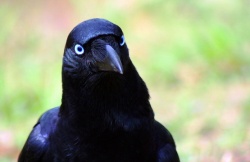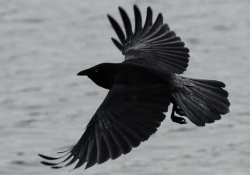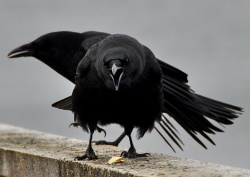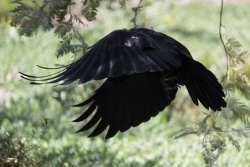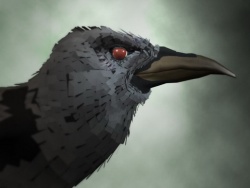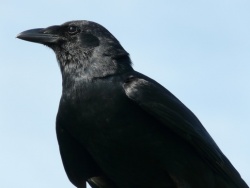Crow vs Raven
While crows and ravens may look similar and are both highly intelligent birds, they are very different in their behavior, habitat and even have physical characteristics that clearly distinguish them from one another.
Crow |
Raven | |
|---|---|---|
| Kingdom | Animalia | Animalia |
| Phylum | Chordata | Chordata |
| Class | Aves | Aves |
| Order | Passeriformes | Passeriformes |
| Family | Corvidae | Corvidae |
| Genus | Corvus | Corvus |
| Feathers | Less shiny, may have lighter markings | Shiny and wet sheen |
| Bill | Smaller and flat. There is no tuft of hair atop the bill. | Bigger, more powerful and curved. There is a tuft of hair atop the bill. |
| Size | Smaller; the size of a pigeon; 17 inches long (approx.); weight around 20 oz | Larger; almost the size of Red-tailed Hawks; 24-27 inches long; Weight around 40 oz |
| Wings | Blunt and splayed; wingspan 32 to 40 inches | Pointed wings; wingspan 46 to 54 inches |
| Life span | 8 years | 30 years |
| Adaptive skills | Like being in human populated areas; more social and audacious | Drawn to carrion cattle and sheep; less social, more cautious |
| Vocalization | Caw- Caw; nasal, high pitched call | Gronk-Gronk, croooaaak; low and hoarse |
| Habitat | Urban landscape | Wilder areas |
| Tail | Fan-shaped | Wedge-shaped |
Physical Appearance
Ravens are larger than crows. So they are longer, weigh more and have greater wingspan. When in flight their necks appear longer than that of a crow. The bill of a raven is also larger. Crows tend to fluff their feathers into a mane and when a raven fluffs up its breast it looks ragged.
The tails are also prominently different and this can be seen clearly when these birds are flying. Ravens have pointed wings and wedge-shaped tails but crows have blunt and splayed wings and fan-shaped tails.
Here's a great video about the differences between ravens and crows and how to tell them apart:
Call of a Raven vs a Crow
Crows generally make the ‘Kaw’ sound in discrete units. A loud Kaw followed by a series of short Kaws. It is high pitched and nasal; crows are louder and have a harsher sound. A raven has deeper and less piercing sound. Their calls may sound like "croooaaak", "gronk- gronk", "tok", and "wonk-wonk."
Listen to these audio recordings:
Intelligence
Crows are very intelligent and are known to devise ingenious ways of getting food and surviving in urbanized environments. The Crow and the Pitcher is one of Aesop's Fables that indicates ancient human observation of corvid behaviour that is goal-directed and indicative of causal knowledge, rather than simply being due to instrumental conditioning. This video also demonstrates the intelligence of modern-day crows in Japan:
Diet
Ravens thrive on small invertebrates, amphibians, reptiles, small mammals, birds, cattle/sheep carrion, human garbage. Crows prefer birds, fruits, nuts, mollusks, earthworms, seeds, frogs, eggs, nestlings, mice and carrion.
Ravens and Crows in Mythology

Crows are associated with war and death in Irish mythology. In Cornish folklore crows are associated with the "otherworld" and so must be treated with respect. In Australian Aboriginal mythology, the crow is an ancestral being. In Buddhism the protector of the Dharma is represented by a crow in one of his physical/earthly forms.
The raven is revered as God by the indigenous peoples of the Pacific Northwest in North America and in northeast Asia. Several totem poles erected by native Americans in Washington, Alaska and Oregon depict ravens and the stories they feature in. In the Old Testament of the Bible there are several references to common Ravens. In the British Isles, ravens were symbolic to the Celts. In Irish mythology, the goddess Morrígan alighted on the hero Cú Chulainn's shoulder in the form of a raven after his death.
